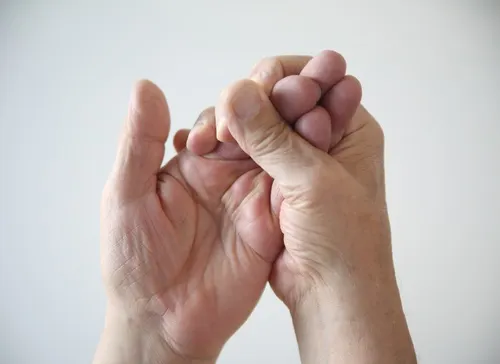Why Do Our Hands Fall Asleep While We Sleep?

You’re asleep. Suddenly, in the middle of the night, you wake up from a kind of “electric shock” in your hands or fingers. Other times, it may seem like someone has come and cut off our limbs in the dark.
These situations can often generate even a certain feeling of panic among people who suffer it. However, it may be due to harmless reasons, such as poor posture.
Do you want to know why your hands fall asleep at night? Find out more in this article!
Why your hands fall asleep: Numbness of the hands

Both cramps and numbness are unpleasant, whether we’re sleeping or not. If it happens once in a while, it’s not a problem. However, if it’s more the rule than the exception, we should pay more attention to these signs.
Both sensations can occur anywhere in the body, although the most common areas are the extremities, i.e. the arms, legs, hands and feet. The symptoms are tingling and prickling sensations, as if dozens of tiny pins or needles are being stuck into us. Some people even experience burning.
The main causes of numbness in the hands while sleeping or lying down are, according to the Mayo Clinic:
- Lack of vitamin B12
- The use of certain medications
- Damage or pressure on a nerve in the hand and wrist
- Staying in a similar position for a long time
- Slight injury to the hands (such as, for example, a blow that we suffered during the day)
- Injury to the neck can cause numbness in the fingers,hands, or arms
- Fluid retention that’s mainly caused by menopause, pregnancy, or being overweight
- Everyday tasks involve flexing and extending the wrist and exerting a lot of force or handling tools that vibrate or exert pressure
Sometimes, numbness in the hands due to a vitamin B12 deficiency is related to taking medications such as metformin. These are used to control diabetes and metabolic syndrome. Or, a similar case may occur with oral contraceptives, antihypertensives, anticonvulsants, treatments for Parkinson’s disease, and cancer, among others.
We think you’d like to read: The Benefits of Elevating Your Legs for 20 Minutes Per Day
Wrist damage and Hands Fall Asleep

Some people find that one or both hands fall asleep at night at least once a week. There are those who go to the doctor to get a diagnosis and there are those who consider it “normal” until it bothers them too much and they decide to see a specialist.
When there’s wrist damage, we can suffer not only from numbness and cramps at night, but even a lack of strength to hold certain objects or great pain when making certain movements. For example, things may fall out of our hands or lack flexibility when we want to do everyday tasks. If this is not treated in time, it can lead to a lack of sensitivity over the years.
To find out if the problem of your hands falling asleep at night is due to a nervous condition, you have to visit a doctor. It’s also essential to know the exact area of pain or discomfort.
In that sense, the fingers most affected by cramps or numbness at night are usually the thumb, index and middle fingers. If this happens, the problem has a name and there are many facts about it.
Let’s take a look.
Hands fall asleep: Carpal Tunnel Syndrome
This condition is also known as “secretary’s syndrome.” In medical terms, it’s defined as a peripheral neuropathy that develops when the median nerve – which runs from the forearm to the hand – is affected by pressure.
The nerve in the wrist is responsible for the sensation and movement of the hand and fingers. When it’s pinched, it causes a number of symptoms, including numbness in this part of the body.
Why does it happen during sleep?
Sometimes, people with carpal tunnel syndrome experience the signs at any time of the day, but they’re worse when they go to bed. This is because the nerve has been working for several hours. When it tries to “rest,” it tightens up.

If the symptoms are reflected in the ring and little fingers, the condition has to do with pressure problems in the ulnar nerve, which can be affected by pressure on the elbow. For example, if you’ve been in an accident and have fallen on your elbow, you will feel a kind of ‘electricity’ in the area.
This nerve is also responsible for mobilizing the area between the collarbone and the first rib. Blood vessels also come into play. For this reason, it’s worth analyzing the numbness well.
It usually appears due to a congenital problem, repetitive movements – for example, if you play tennis (as this research from the Villaviciosa de Odón Health Centre in Madrid states ) – or due to repeated bad postures over time.
You might like: Relieve Back Pain with a Simple Breathing Technique
What to do when your hands fall asleep?

If you’re experiencing symptoms of numbness, warmth, or tingling in your hands (especially at night), there’s a good chance that you have carpal tunnel syndrome or an ulnar nerve condition.
In both cases, it’s recommended that you see your doctor for professional testing. If the problem is not treated, the pain will become unbearable over time, and you will also eventually suffer from it during the day.
The inability to distinguish between hot and cold is already a serious consequence. So is the atrophy of the base of the thumb, according to this study conducted by the National Institute of Medical Sciences and Nutrition Salvador Zubirán. Also, the risk of suffering from these problems is higher in women.
Exercises to prevent numbness
To avoid going to such extremes, certain basic exercises are recommended to help improve circulation in your hands.
- Squeeze a small rubber ball in the palm of your hand. They’re available at toy or pet stores.
- Close your fingers and apply pressure.
- Repeat several times, holding the pressure for a few seconds before returning to the starting position.

Finally, you can also do it while watching a movie, reading a book, or taking a soak in the bath. The important thing is that you practice every day for a few minutes. This way, the nerve will be strengthened and you’ll notice that your hands don’t fall asleep at night.
Remember that you should see a doctor in case of any problem of this type, especially if the numbness is prolonged over time or is accompanied by other symptoms, such as fever or other discomfort. Quick prevention is always key.
All cited sources were thoroughly reviewed by our team to ensure their quality, reliability, currency, and validity. The bibliography of this article was considered reliable and of academic or scientific accuracy.
- http://www.medciencia.com/doctor-por-que-se-me-duermen-las-manos
- Clínica Mayo. https://www.mayoclinic.org/es-es/symptoms/numbness-in-hands/basics/causes/sym-20050842
- VV.AA. (2007). Dolor en adultos mayores de 50 años: prevalencia y factores asociados. http://www.scielo.org.mx/scielo.php?script=sci_arttext&pid=S0036-36342007001000008
- Villalobos Baeza, Elena.,Rodríguez Alonso, Juan José.,Torres Fuentes, Andrés. (2009). Diagnóstico y tratamiento de la epicondilitis en atención primaria. https://www.sciencedirect.com/science/article/abs/pii/S1134207208708223
This text is provided for informational purposes only and does not replace consultation with a professional. If in doubt, consult your specialist.








